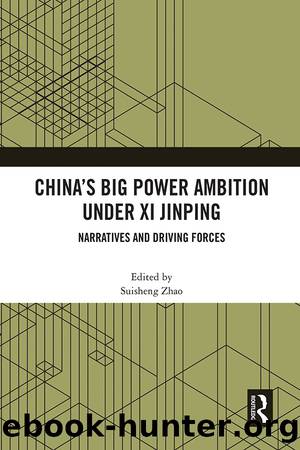China's Big Power Ambition Under XI Jinping: Narratives and Driving Forces by Suisheng Zhao

Author:Suisheng Zhao [Zhao, Suisheng]
Language: eng
Format: epub
ISBN: 9781032057217
Google: cMaUzgEACAAJ
Goodreads: 58729856
Publisher: Routledge
Published: 2021-12-15T00:00:00+00:00
Neoliberal Affinity: A Coeffect, Not A Cause
Despite the limits of Pan and Xuâs research, they plausibly conclude that being politically liberal is highly correlated with pro-market attitudes in contemporary China applies to Chinese liberal intellectuals as well. Indeed, given the fact that Chinaâs Reform-and-Opening coincided with the Reagan-Thatcher era, when neoliberalism as an ideology rose to dominance across the globe, it is hardly surprising that the latter has had huge influences on the ways in which most Chinese liberal intellectuals would understand the world and approach political issues. Therefore, a seemingly straightforward response to the phenomenon of liberal Trump-idolization in China might be that it is not curious at all.
According to this seemingly straightforward âneoliberal affinityâ explanation, contemporary Chinese liberalism is no more than a local variant of Reagan-Thatcherism, whose hegemony in the globalization era is achieved through âcombining various contradictory agendas within an overarching neo-liberal framework of ideas,â especially through combining âextensive marketisation, the commercialization of public services, de-regulation and privatizationâ with âother more traditional attachments of the right, notably to patriotism, elitism and a strong commitment to law and orderâ.21 Neoliberal elites had used those âmore traditional attachments of the rightâ as intellectual and electoral allies against the left and the center-left (e.g. âliberalsâ in the American sense), but now they could no longer âtameâ those elements, which have been fully mobilized, normalized and legitimized through decades of such alliance. In the United States, for example, self-styled âlibertariansâ and âfiscal conservativesâ within the Republic Party have, long before the rise of Trump, gradually succumbed to, and internalized, more and more extreme versions of cultural conservatism and rightwing nationalism.22 By the same token, according to this âneoliberal affinityâ explanation, it is more than natural for Chinese âliberalâ intellectuals, who truly are Reagan-Thatcherite neoliberals deep down, to be captivated by bursting Trumpism.
There might be some degree of truth to this explanation. After all, a substantial proportion of the Chinese liberal intellectuals who fervently defend Trump and his policies are diehard market fundamentalists, such as Liu Junning, former research fellow at Chinese Academy of Social Sciences expelled for his advocacy of political reform, and Wang Jianxun, associate professor of law at Chinese University of Political Science and Law who received his Ph.D. in political science from Indiana University-Bloomington.23
Even those who refuse to call themselves âChuanfenâ because they disdain Trumpâs personality or disagree with some of his policy positions have argued that he is a âlesser evilâ for American democracy, compared to the, relatively speaking, socioeconomically redistributive and regulatory Democratic Party. For example, during the 2016 U.S. presidential election, Liu Yu, a Columbia-educated associate professor of political science at Tsinghua University famed for her best-selling Minzhu de Xijie [Details of Democracy], asked rhetorically: âAs the public opinion in Europe and the U.S. keeps shifting to the left generation by generation, the diversity of opinions quickly vanishing, will there be any force that could prevent Bernie Sanders from becoming Hugo Chavez?â According to Liu, implementation of redistributive policies is the prelude to âLatin-Americanizationâ: because the majority of the society, a.
Download
This site does not store any files on its server. We only index and link to content provided by other sites. Please contact the content providers to delete copyright contents if any and email us, we'll remove relevant links or contents immediately.
| Anthropology | Archaeology |
| Philosophy | Politics & Government |
| Social Sciences | Sociology |
| Women's Studies |
The Secret History by Donna Tartt(19052)
The Social Justice Warrior Handbook by Lisa De Pasquale(12187)
Thirteen Reasons Why by Jay Asher(8893)
This Is How You Lose Her by Junot Diaz(6877)
Weapons of Math Destruction by Cathy O'Neil(6264)
Zero to One by Peter Thiel(5786)
Beartown by Fredrik Backman(5737)
The Myth of the Strong Leader by Archie Brown(5499)
The Fire Next Time by James Baldwin(5431)
How Democracies Die by Steven Levitsky & Daniel Ziblatt(5215)
Promise Me, Dad by Joe Biden(5141)
Stone's Rules by Roger Stone(5081)
A Higher Loyalty: Truth, Lies, and Leadership by James Comey(4954)
100 Deadly Skills by Clint Emerson(4921)
Rise and Kill First by Ronen Bergman(4779)
Secrecy World by Jake Bernstein(4741)
The David Icke Guide to the Global Conspiracy (and how to end it) by David Icke(4706)
The Farm by Tom Rob Smith(4502)
The Doomsday Machine by Daniel Ellsberg(4484)
